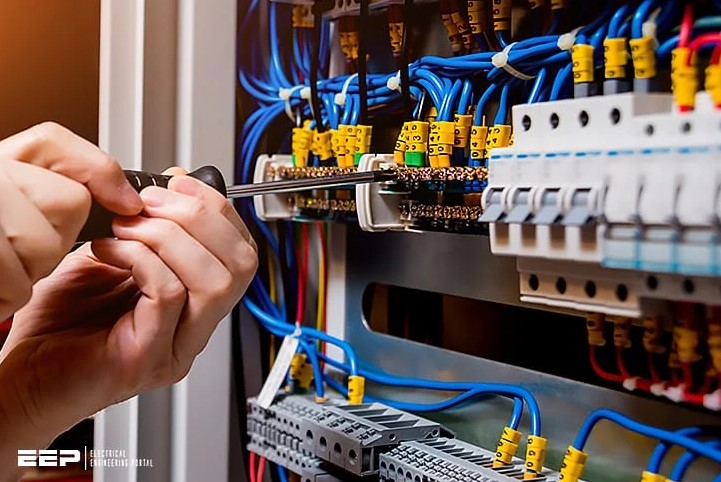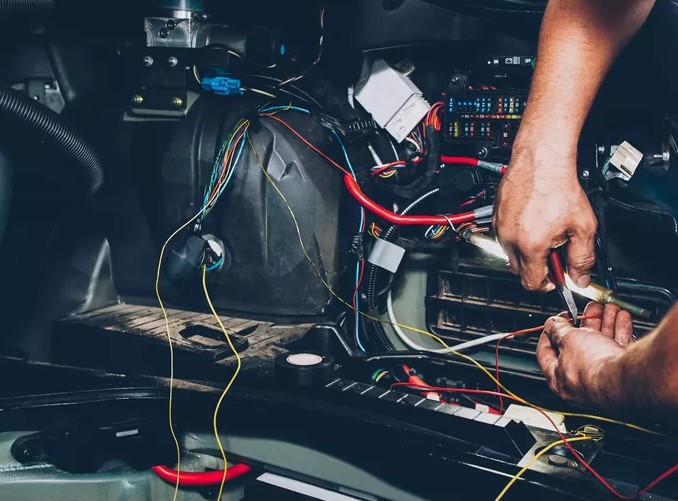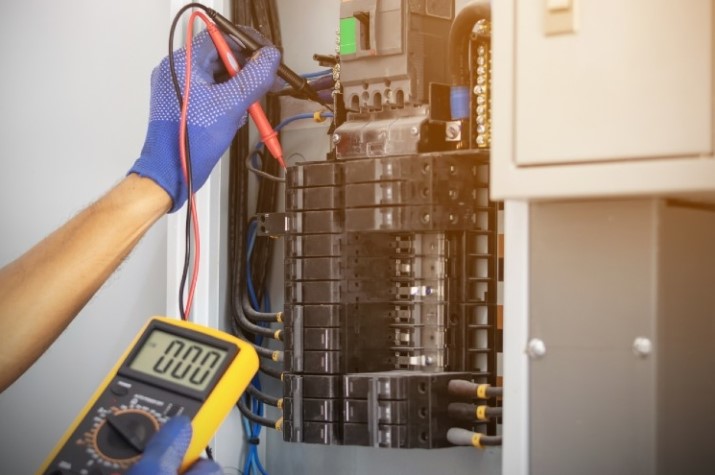Have you ever wondered about the mysterious world of electricians and their role in our everyday lives? In today’s technology-driven society, these skilled tradespeople play a significant part in ensuring that our homes, businesses, and industries are efficiently powered.
From installing and maintaining electrical systems to troubleshooting complex wiring problems – electricians do it all! This blog, Derosa Electric will dive into the various aspects of an electrician’s job and uncover some fascinating facts along the way.
Who Is An Electrician?
An electrician is a skilled tradesperson who specializes in the installation, repair, and maintenance of electrical systems in residential, commercial, and industrial settings.
Definition And Overview
An electrician is a skilled tradesperson who specializes in the design, installation, maintenance, and repair of electrical systems within various settings, including residential homes, commercial buildings, and industrial facilities.
The role of an electrician extends beyond simply fixing a broken light switch or troubleshooting outlets— these experts are responsible for ensuring the safe and efficient operation of all aspects related to electricity.
Notably different from general handypersons or DIY enthusiasts with basic electrical know-how, licensed electricians have undergone rigorous training programs to master skills like interpreting blueprints and complying with local safety codes.
Roles And Responsibilities In Residential, Commercial, And Industrial Settings
Electricians play a crucial role in ensuring that the electrical systems in residential, commercial, and industrial settings are safe and functional. In residential settings, electricians install and maintain wiring, lighting fixtures, and auxiliary electrical systems.
They also troubleshoot issues with circuit breakers, fuses, outlets, and switches.
Moreover, electricians adhere to safety codes at all times when handling electricity to prevent accidents or fire hazards. They use tools like wire cutters strippers pliers among others daily.
Overall these skilled tradespeople provide invaluable services for both homeowners and businesses alike ensuring the efficient running of electrical infrastructure while keeping those around it safe.
What Do Electricians Do?
Electricians perform a wide range of tasks, including installing and maintaining electrical systems, troubleshooting and repairing electrical issues, upgrading electrical systems to meet current standards, and ensuring compliance with safety codes and regulations.
Install And Maintain Electrical Systems
Electricians are responsible for installing and maintaining electrical systems in a wide range of settings, from residential homes to large industrial facilities. This means they must have a good understanding of how wiring, control systems, and lighting work together to provide safe electricity access.
Maintenance is also an important part of their job since electrical systems require regular checkups to ensure optimal performance. They need to be able to troubleshoot any issues that arise quickly and efficiently while following safety codes and regulations.
Troubleshoot And Repair Electrical Issues
Electricians are responsible for fixing electrical issues in homes, commercial buildings, and industrial settings. When an electrical system starts to malfunction or stops working altogether, electricians use their expertise to identify the root cause of the problem quickly.
Once they have identified the source of the problem, electricians can repair or replace faulty wires or damaged parts. Sometimes this involves just a simple fix such as replacing a fuse or changing a light bulb while other times it may necessitate rewiring entire sections of a home’s electrical systems.
In addition to repairing problems when they occur, electricians also perform scheduled maintenance on electrical systems such as upgrading equipment before it becomes outdated or testing circuits regularly to prevent future issues from arising.
Upgrade Electrical Systems
Electricians play a vital role in upgrading electrical systems. It is important to upgrade an electrical system periodically to ensure safety, efficiency and keep up with technological advancements.
Electricians can assess the current system and recommend upgrades that meet the client’s needs. Some common upgrades include installing energy-efficient lighting, adding new outlets and circuits as well as replacing outdated wiring.
According to [IMPORTANT FACTS], it takes around seven years of training to become a skilled electrician, which means they have all the necessary knowledge and expertise needed for these types of jobs.
They use various types of tools like wire strippers, pliers, cable cutters, etc., allowing them to complete work quickly without compromising quality.
Ensure Compliance With Safety Codes And Regulations
Electricians play a crucial role in ensuring that all electrical systems are up to code and meet the necessary safety regulations. It is their job to follow strict guidelines to make sure that wiring, control devices, and other electrical components are installed correctly and safely.
To ensure compliance with safety codes and regulations, electricians must stay up-to-date on the latest rules and requirements set by regulatory bodies such as the National Electrical Code (NEC).
For example, an electrician might inspect a commercial building’s auxiliary electrical system during routine maintenance checks. If they discover outdated equipment or signs of wear and tear that could pose a hazard if left unfixed, they will take steps to address the issue immediately.
How To Become An Electrician
To become an electrician, you will need to complete a four-year apprenticeship program and earn a high school diploma or GED; additionally, many states require electricians to obtain licenses or certifications.
Education And Training Requirements
To become a skilled electrician, one must undergo comprehensive training and education. Typically, an aspiring electrician should have at least a high school diploma or GED equivalent to enter into an apprenticeship program.
Following the completion of their apprenticeship programs, electricians may need to obtain licenses or certifications depending on their state’s regulations. Some states require additional coursework in specialized areas such as industrial electrical systems for those who wish to work with high-voltage installations.
Becoming an electrician requires persistence and patience as it takes several years of practical experience before one can become fully certified.
Licensing And Certification Processes
To become a licensed electrician, candidates must complete an approved vocational training program and pass a licensing exam. Certification is also available from several industry organizations, such as the National Joint Apprenticeship and Training Committee (NJATC).
Aspiring electricians may have to meet additional state-specific requirements before they can become licensed.
Once they are licensed, electricians must keep up with continuing education courses to stay current on the latest developments in their field. This ensures that they remain knowledgeable about new electrical codes and regulations that affect their work.
Additionally, certified electricians demonstrate their expertise and professionalism in the industry by passing rigorous exams that test their knowledge of electrical theory, safety regulations, wiring techniques, and troubleshooting procedures.
Key Skills And Qualities
Becoming a skilled electrician requires more than just technical knowledge. Key skills and qualities that are essential for success in this trade include attention to detail, problem-solving abilities, physical dexterity, and excellent communication skills.
In addition to these traits, electricians must be able to work independently or as part of a team. They must be able to read and interpret complex technical documents accurately while also keeping up with the latest safety codes and industry regulations.
Attention to detail is crucial when working on intricate electrical wiring systems or identifying faulty components that need repair or replacement.
When To Hire An Electrician
If you are experiencing electrical emergencies, planning home renovations and additions, require electrical safety inspections, or need upgrades and improvements to your existing systems, it’s time to consider hiring an electrician.
Electrical Emergencies
In the event of an electrical emergency, it is important to contact a licensed electrician immediately. Such emergencies can include power outages, downed or damaged power lines, and electrical fires.
Attempting to handle these situations without proper training can be dangerous and even life-threatening.
If you notice any signs of an electrical fire such as burning smells or sparks coming from outlets or appliances, immediately unplug affected devices and switch off your main electrical supply.
Electricians are trained professionals who have the skills necessary for handling various types of emergencies in residential, commercial, and industrial settings. They are equipped with specialized tools that allow them to diagnose issues quickly and safely and make any repairs needed.
Home Renovations And Additions
You may want to hire an electrician for your home renovation or additional projects. Whether you are remodeling your kitchen, adding a room, or upgrading your outdoor living space, electricians can provide you with the electrical services you need to ensure your project is safe and functional.
They will work with other contractors on-site to install new wiring and lighting systems that meet safety codes and regulations. For example, if you plan to add new outlets for appliances in your kitchen, upgrade light fixtures in your bathroom, or install a new ceiling fan in your bedroom, electricians can help make it happen.
With their training and expertise in different types of wiring systems, they can also assist with troubleshooting any issues that arise during the renovation process.
Electrical Safety Inspections
Electricians also offer electrical safety inspections to ensure that electrical systems and equipment in homes or buildings are safe and up-to-code. These inspections can help identify potential hazards such as outdated wiring, overloaded circuits, faulty electrical panels, or improper grounding.
During an inspection, electricians use specialized tools to measure electricity flow, test outlets and switches for proper function, check smoke detectors and carbon monoxide detectors, and evaluate the overall condition of the system.
Regular electrical safety inspections by a licensed electrician not only protect individuals from harm but can also prevent costly damage caused by fire or other electrical emergencies.
Upgrades And Improvements
Electricians also offer services for upgrading and improving electrical systems. This can involve adding new components to existing systems, such as installing smart home technology or adding auxiliary electrical systems like generators.
Upgrades may also be necessary to keep up with changes in electrical codes and regulations or to improve energy efficiency. For example, an electrician might upgrade a residential home from a 100-amp service to a 200-amp service to accommodate increased electricity usage or install LED lighting to reduce energy consumption.
Conclusion
Electricians play a crucial role in our daily lives. They are skilled tradespeople who install, maintain, and repair electrical systems in residential, commercial, and industrial settings.
To become an electrician, you need to have the right qualifications and skills.
When it comes to hiring an electrician, there are many situations where their expertise is necessary.
In summary, if you want dependable electrical service for your home or business needs – look no further than your local electrician!
FAQs:
1. What is the job of an electrician?
An electrician’s primary responsibility is to install and maintain electrical systems in residential, commercial, or industrial settings. They also troubleshoot problems with existing electrical equipment and ensure that all work complies with safety regulations.
2. What kind of skills do electricians need?
Electricians must possess a technical understanding of electricity, wiring diagrams, hand, and power tools, as well as safety practices relevant to their field. Good problem-solving skills are essential for diagnosing issues correctly and finding solutions efficiently.
3. Is it dangerous to work as an electrician?
Electrical works inherently have risks associated with them since they deal with live wires carrying high voltage levels that could cause electrocution if improperly handled. As such, stringent safety requirements must be observed by licensed electricians when working on any project requiring electricity; these typically include wearing protective gear such as gloves, goggles, and insulated shoes.
4. How can I become an electrician?
To become a licensed electrician in most states requires completing formal apprenticeship training programs or attending vocational schools specializing in electrical technology courses similar coursework varies depending upon state-specific laws & regulations governing licensing procedures and often require passing exams assessing knowledge\hands-on ability before earning credentials enabling individuals seeking employment opportunities therein (e.g., contractor roles) performing repairs/installations across different industries ranging from healthcare facilities through construction projects involving various types’ buildings/structures, etc.
Key Takeaways
- Electricians are skilled tradespeople who specialize in designing, installing, maintaining, and repairing electrical systems in residential, commercial, and industrial settings.
- They perform tasks such as troubleshooting and repairing electrical issues and upgrading electrical systems to meet current standards while ensuring compliance with safety codes and regulations.
- Becoming an electrician takes dedication, persistence, and patience. It requires completing a comprehensive four-year apprenticeship program alongside obtaining certifications depending on the state’s regulations.
- Ultimately, hiring an experienced electrician is essential for anyone looking to upgrade their home or business’ power infrastructure effectively while also ensuring the safe operation of all components related to electricity.
Read more:






